Whether you teach one child or eleven, I’d argue that homeschooling is just about the most emotionally draining job on the planet.
I have four children, in different grades ranging from kindergarten to high school, and I am here to tell you: homeschooling can be utterly exhausting. You can’t dedicate all your time to teaching; you still have to cook, clean house, deal with discipline and character training, and settle sibling spats throughout your day. Sometimes I feel overwhelmed just thinking about it.
While it does get easier as your children get older, time seems to vanish before you have a chance to blink. One day you’re introducing your first child to the alphabet, then suddenly, you’re teaching a high schooler. It’s easy to feel buried by all the need-to, want-to, and wish-I-would-have regrets.
Do you miss those early years when it seemed you could play and laugh the days away? When mom and kids are all enjoying themselves, those can be some of the best moments in home education. I want to share with you several ideas for carving out time to have fun with your children again, while still learning.

Pre-school and Elementary years
These are the golden years. Children’s minds, like sponges, are soaking up every drop of knowledge around them. Things are new and interesting, they’re curious enough to want to explore it all. Go with it!
You don’t need to buy an expensive Montessori Farm to use the brilliant idea of one. You can make your own, or simply get out whatever farm animals you already have and let language come alive. The concept is so simple: your child sets up a scene, then comes up with sentences about what is happening on the farm. You can do the exercise orally with very young children, progressing to pre-printed words the child can arrange into sentence form. Once the child is old enough, he can write out sentences or short stories.
Ask grammar questions. Let your child point out nouns, verbs, adjectives, etc. The Montessori method uses special symbols for the different parts of speech, that can be used to label sentences. Free Montessori printables are readily available online.
While I’m on the topic of Montessori-inspired ideas, how about using the movable alphabet? Whether it’s homemade or you invest in a blue and red wooden letter set, the ideas for using the moveable alphabet are endless. Spelling words are obvious, but we’ve done a plethora of phonic activities with these: beginning sounds, ending sounds, what letter is missing? There is something about touching the letters, building words with their hands, that makes language so much more fun and interesting for your kids.
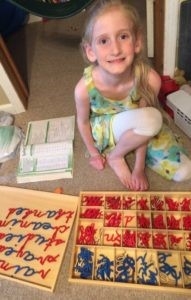
I discovered a Waldorf-inspired game for skip counting, and made my own rather than purchasing one. Wrapping the yarn to count by twos creates a different shape than counting by threes or fives, for example.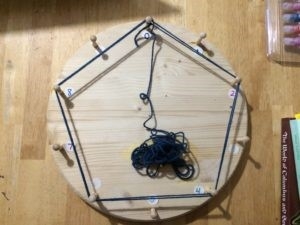
We’ve collected tiny dollhouse-sized objects that begin with all the letter sounds. Whether you focus on one letter at a time, or mix a few bags and let the child sort them back out, you are developing reading skills while your child plays.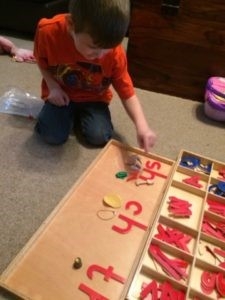
Pull out the play food. When your child reads a word, she can feed one of her animals a piece of food. Cut loose and join in by making outrageous, hilarious eating sounds.
Playtime is more fun with mom and dad. Enjoy life with your children—they won’t remember that worksheet page, but they’ll always cherish memories of their parents playing with them.
I once read about a math game called Math-it in an old Montessori book I was reading. I couldn’t find the game for sale anywhere, so I got a local woodcarver to make it for me. It’s a simple board with 20 holes for holding two rows of little number pegs from 0-9. You only need one set of the pegs. There are two players. Each take turns trying to get all the pegs from the other persons side to theirs. You need one 12 sided die. You roll the die and try to create number combinations making said number. It can be as simple as adding or subtracting two numbers, or making up multiplication and division story problems. When you successfully get all the pegs to your side of the board, you win.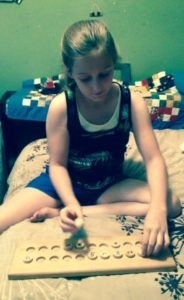
Math War is another fun game; there is an addition and subtraction version, as well as one for multiplication and division.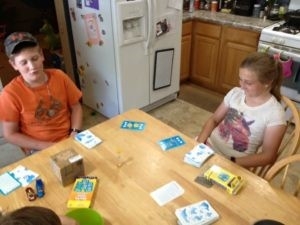
How about that iPad? I know electronic devices get a bad rap, but there’s plenty of good content, too. Some of our favorites are Letter School, the games in Kids Planet Discovery, StoryBots, and the TinyBop collection.
Middle-School and the Upper Grades
Just because your kids are getting older doesn’t mean they don’t still like to play. It may not be stuffed animals anymore, but games are fun at any age. Now your children are old enough to help design the games. Let them come up with ideas for a board game. Help them make flash-card-questions to move around the board. Whether they are studying science, history, or Latin, it doesn’t matter. Just the act of making the game will teach them a lot.
If you are too busy or you think you lack the creativity for coming up with your own game, check out the Professor Noggin games, Math Chef, or the Nasco’s Joke Worksheets books.
Buy a set of plastic war pieces, and let your kids act out the Revolutionary or Civil war, or other historic campaigns. (Then, just for fun, let them launch pom-pom grenades at each other’s troops, and see an entirely different battle come to life in your living room.)
There are iPad games for middle and high school learning as well: A+ Spelling (we use this to study spelling words each week), Word Connect, Duolingo, and Presidents vs. Aliens, to name a few.
Read Chester the Crab Comix books for History. Watch the Liberty’s Kids series. Play the Oregon Trail computer game.
A few closing thoughts…
We live in an age of abundance, in so many ways. Curriculum options seem almost endless. If you have a question, you can find the answer with the touch of a button—and those same buttons can help you find ideas for teaching anything on the planet. Name any subject; if you’re studying it with your child, you can bet some creative genius has been there before you, and left fun, inspiring ideas just dangling out there on the web for you to utilize.
Your kids will certainly still do worksheets and textbook learning, but relax a little and don’t be afraid to introduce fun into your classroom. Spice up your methods every once in awhile; your kids will enjoy the breath of fresh air, as will you. After all, when the class has a better attitude, so does the teacher (that’s you, Mom!)…and that goes both ways.

Love these ideas.
And what’s really cool about playing with your kids as they grow up….when they’re married on their own they still want to play games with you! Our married kids often call us for unplanned game nights. All the fun of parenting without all the responsibilities.
That’s sounds so awesome Jenny. I hope all my children live close when they grow up! ❤️